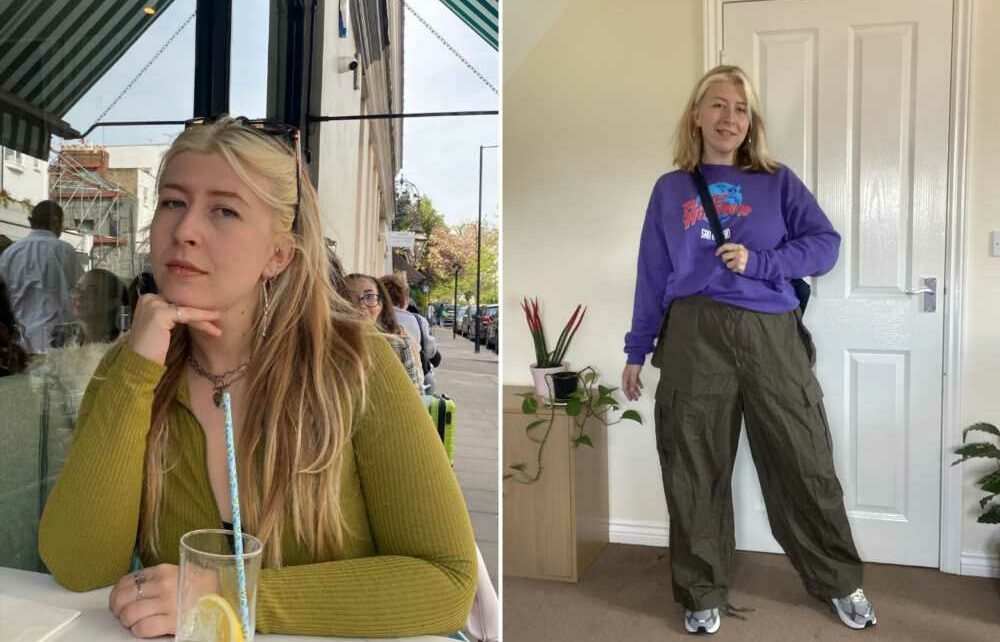A FORMER fast fashion addict who now shops exclusively in charity shops has admitted she calls out people who wear like the likes of Shein.
Lottie Lashley reckons she now saves a whopping £300 month shopping second hand – a move she defines as “ethical”.
The 25-year-old is happy to bash people at parties, as well as her family and friends, as “unethical” for buying mass produced clothes.
Lottie, who lives in London, says she fell into a “fast fashion addiction” as a “coping mechanism” when she went to university.
Research shows that the brain releases happy hormone dopamine when online shopping,
This dopamine rush can become an addiction, or a “high” that shoppers keep chasing to feel rewarded.
read more on fast fashion

I was trapped under concrete with bodies on my legs in Rana Plaza tragedy

Primark makes huge change to it’s sizing – and people aren't sure how to feel
After looking into the ethics of fast fashion, Lottie ditched her habit and now uses charity shops twice per week to save an eye-watering £300 a month on clothes.
The social video editor is passionate about championing charity shops and has launched a TikTok account where thousands follow her tips and tricks to finding the best second-hand finds.
Lottie is more than happy to confront work colleagues and friends on what they are wearing if it isn’t sustainably sourced.
One of her videos describes how if someone tells her about their recent fast fashion purchase, she will “immediately pull a grossed out face and tell them about how the garment was made by people working in inhuman conditions”.
Most read in Fabulous

Spotify boss reveals why Harry & Meghan’s £18m podcast deal ‘didn’t work’

When it comes to love, the smile you can’t forget can suddenly reappear

I use shampoo to wash my clothes it’s cheaper than pods but there’s one caveat

Lad, 17, who wed pensioner after meeting at funeral pays tribute as she turns 80
"I really got into fast fashion when I went to uni and I used it as a coping mechanism, which a lot of women do,” Lottie says
"I would say it was an addiction to fast fashion, just the seeing it, and needing to have it.
"And then I looked into the ethics of fast fashion five years ago and I realised how un-environmental it was.
"I realised I needed to use my skills with social media to share my love of sustainable fashion online.
"I talk to my colleagues about it and at parties.”
Lottie’s Top Thrifting Tips
- Have a list of what you want to find before you enter a charity shop
- Take regular breaks from browsing to avoid getting overwhelmed or fatigued
- Always try stuff on, even though it's draining
- I think the more clothes you donate to a charity shop, the more good things come back to you
- The right items will find you
The eco-warrior is a firm believer that your consumption “shouldn't impact other people's lives”.
"The fact that the garment workers at [factories that supplied to] Shein were said to be sometimes getting paid 3p per garment, I'm so happy to question people on why they support Shein,” she says.
"Then you have other fast fashion companies with staff working up to 18-hour days seven days a week in inhumane conditions.
"No matter where you're getting your clothes from, you've got to look into it and see where they're getting their clothes from on the other end.
"It's not about shaming people, but there's so many things second hand on Vinted and eBay we can be consuming too."
Lottie has been charity shopping since she was a teen, and has now amassed so many items her wardrobe is 80% second-hand.
To get the best finds, she plans which charity shops she'd like to visit on trips ahead of time.
And while does not shop on the high street anymore, the last item she “consciously consumed” was a pair of trousers a year ago.
"If I do buy stuff consciously, I need to know I'm going to wear them again and again,” Lottie explains.
"I used to really feel like I had to conform to high street trends, and when I wore second-hand fashion I really found my style.
"Co-workers will ask about my outfit and say, 'I know it's all second-hand so there's no point in asking where it's from'. But I'll help them find similar things on Vinted and stuff."
Shein is based out of China and rose to online fashion fame thanks to its questionably low prices and the flaunting of mammoth hauls on social media.
The company was valued at $66billion earlier this year, dwarfing that of popular high street brands Zara and H&M.
A Shein spokesperson said: "Shein is committed to managing our supply chain responsibly and providing a safe work environment for all our suppliers' employees.
"All suppliers must abide by our Shein Responsible Sourcing (SRS) standards, a supplier code of conduct based on the International Labor Organization conventions and local laws and regulations.
Read More on The Sun

Towie’s Chloe Brockett opens up about feud after her mum unfollows co-star

I’m a Sky expert and TV users are still missing a little-known remote trick
"We pay manufacturing suppliers competitive rates so they can support their workers. If they violate our SRS standards on issues like unethical labor practices or poor working conditions, we take swift action, including termination if a serious violation isn’t corrected.
"The SRS program ensures workers at our suppliers' facilities are paid fairly. An independent wage investigation from Intertek in Q2 showed that workers at Shein's supplier factories are paid much higher than the average salary of private employees in the same cities and are significantly higher than the local industry level."
Source: Read Full Article




